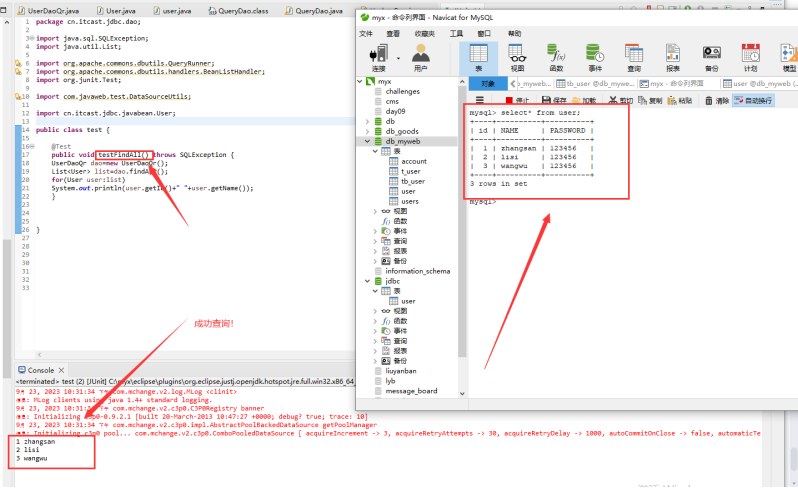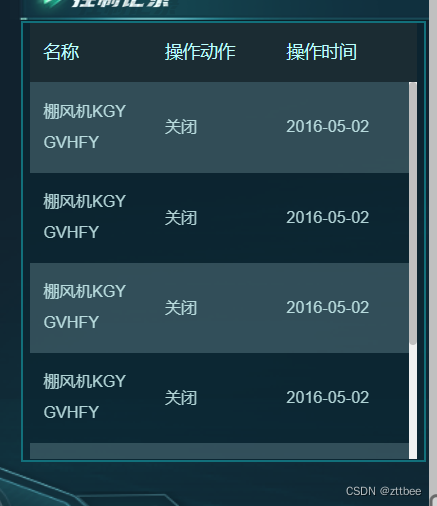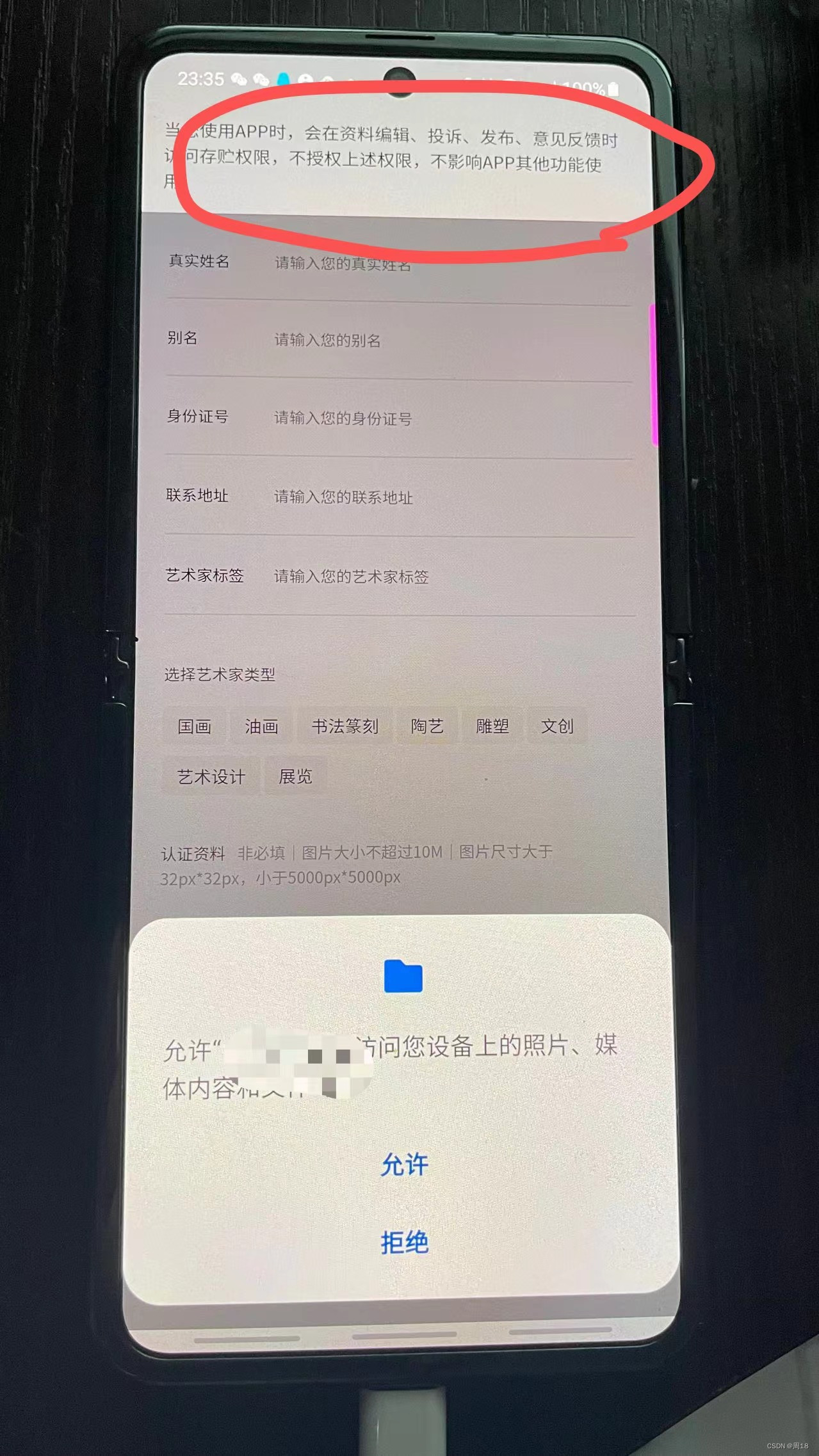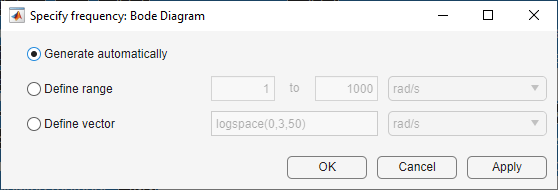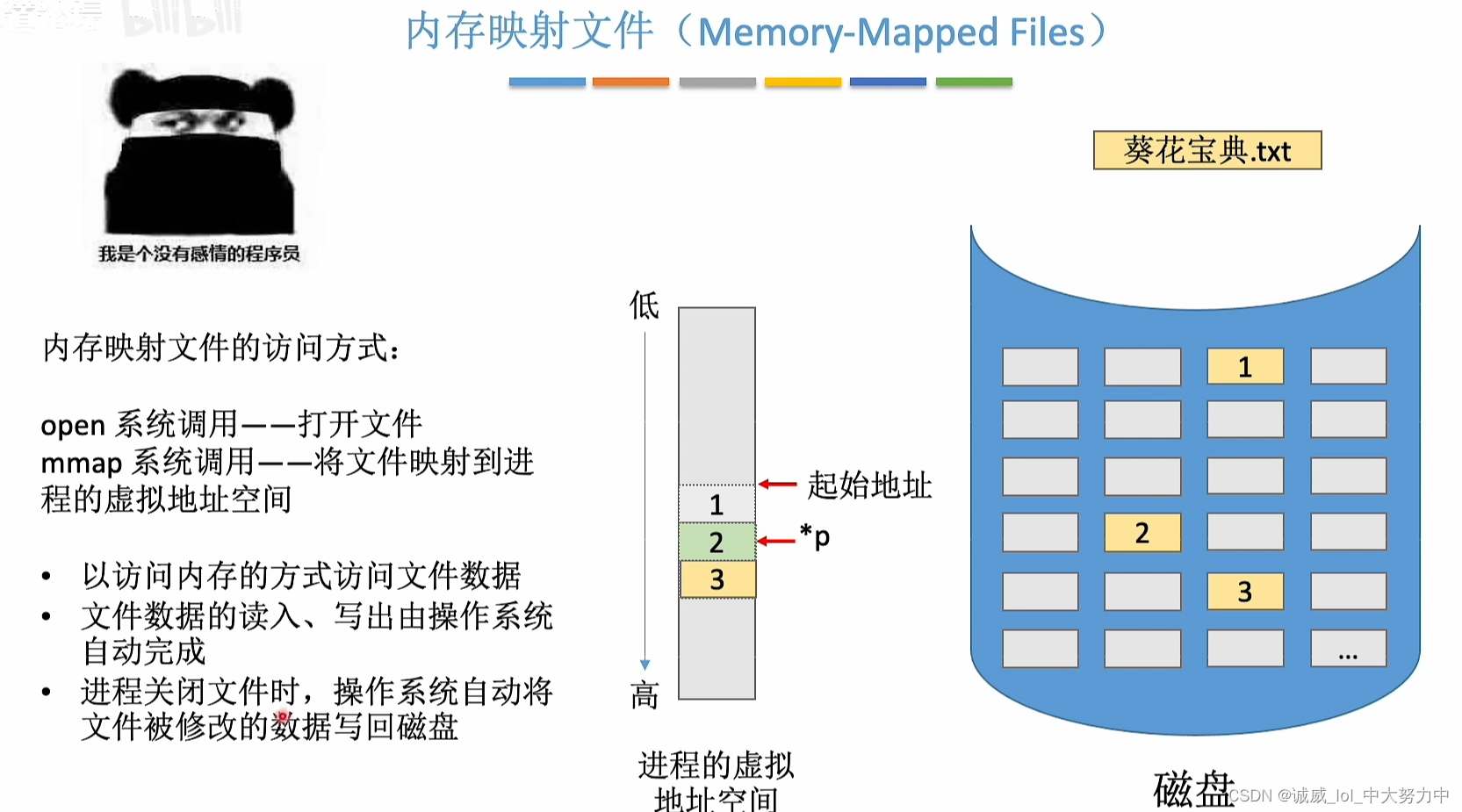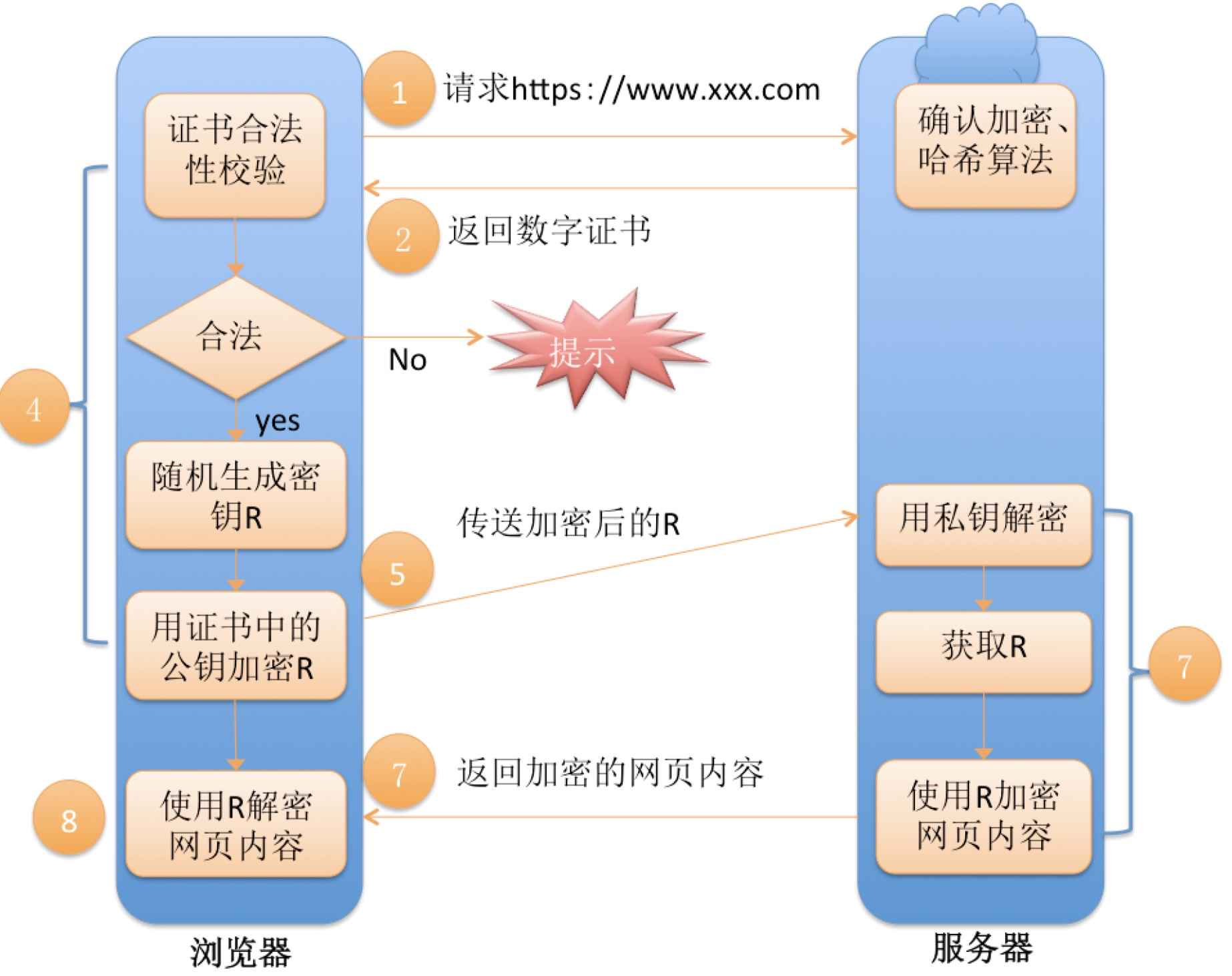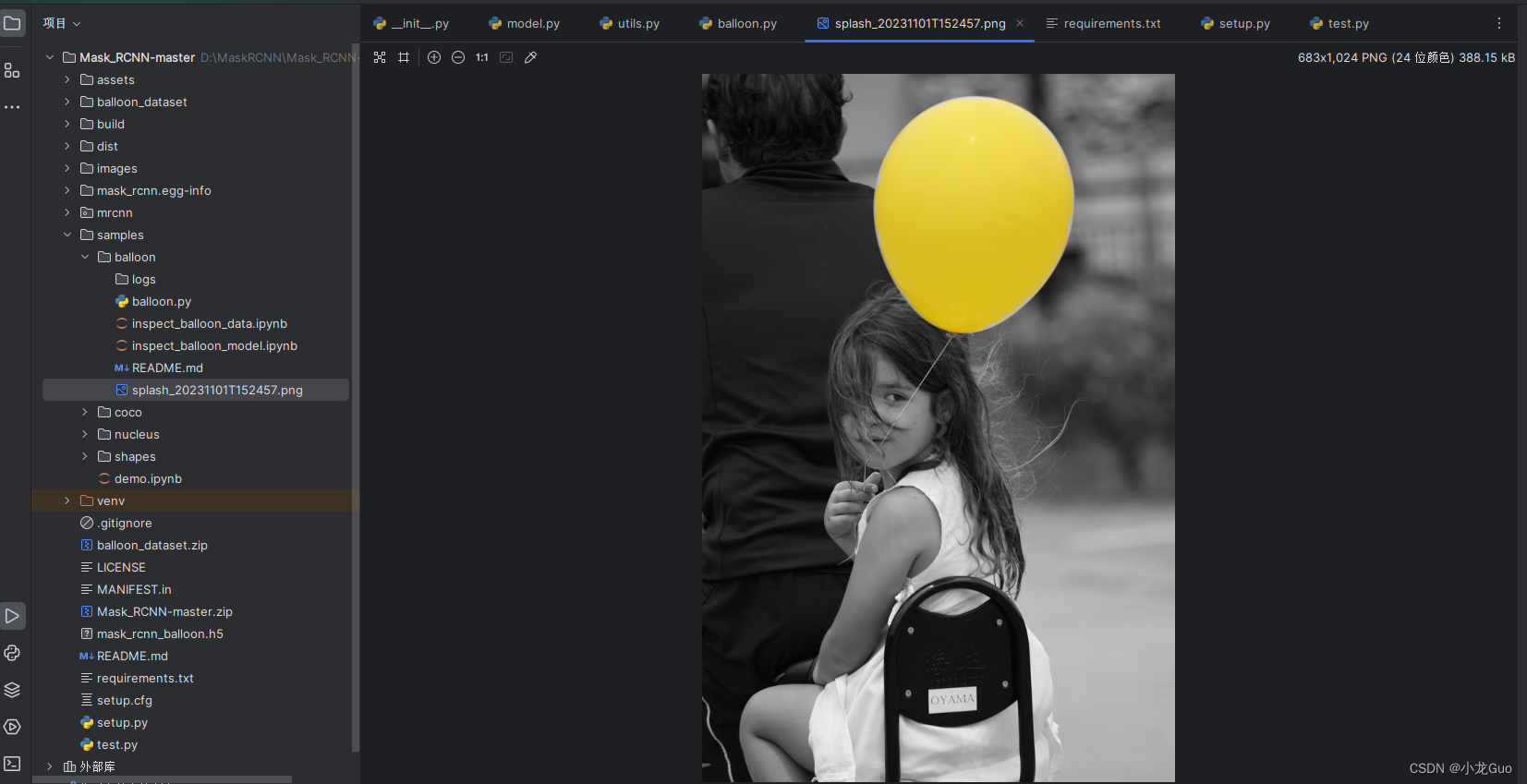目录
概述
一、开发环境
二、STM32CubeMx配置
三、编码
四、运行结果
五、总结
概述
一个成熟靠谱的项目,离不开“看门狗”的必选项,凡是人写的程序多少都会有出现bug的情况(或芯片外设受外界干扰导致故障程序卡死、跑飞的情况)。为了避免产品变成砖头,引入看门狗是很有必要,可以有效解决程序的跑飞(确保程序在大部分情况能正常运行)。
来自百度百科解释(看门狗)
看门狗定时器(WDT,Watch Dog Timer)是单片机的一个组成部分,它实际上是一个计数器,一般给看门狗一个数字,程序开始运行后看门狗开始计数。如果程序运行正常,过一段时间CPU应发出指令让看门狗置零,重新开始计数。如果看门狗增加到设定值就认为程序没有正常工作,强制整个系统复位。
STM32的内置看门狗-(详细请移步参阅-STM32F4xx中文参考手册.pdf文档)
STM32内置两个看门狗,提供了更高的安全性、时间的精确性和使用的灵活性。两个看门狗设备(独立看门狗、窗口看门狗)可以用来检测和解决由软件错误引起的故障。当计数器达到给定的超时值时,触发一个中断(仅适用窗口看门狗)或者产生系统复位。
1)、独立看门狗(IWDG)由专用的低速时钟(LSI)驱动(32kHz),即使主时钟发生故障它仍有效。独立看门狗适合应用于需要看门狗作为一个在主程序之外 能够完全独立工作,并且对时间精度要求低的场合。
2)、窗口看门狗由从APB1时钟(84MHz)分频后得到时钟驱动(42MHz)。通过可配置的时间窗口来检测应用程序非正常的过迟或过早操作。 窗口看门狗最适合那些要求看门狗在精确计时窗口起作用的程序。
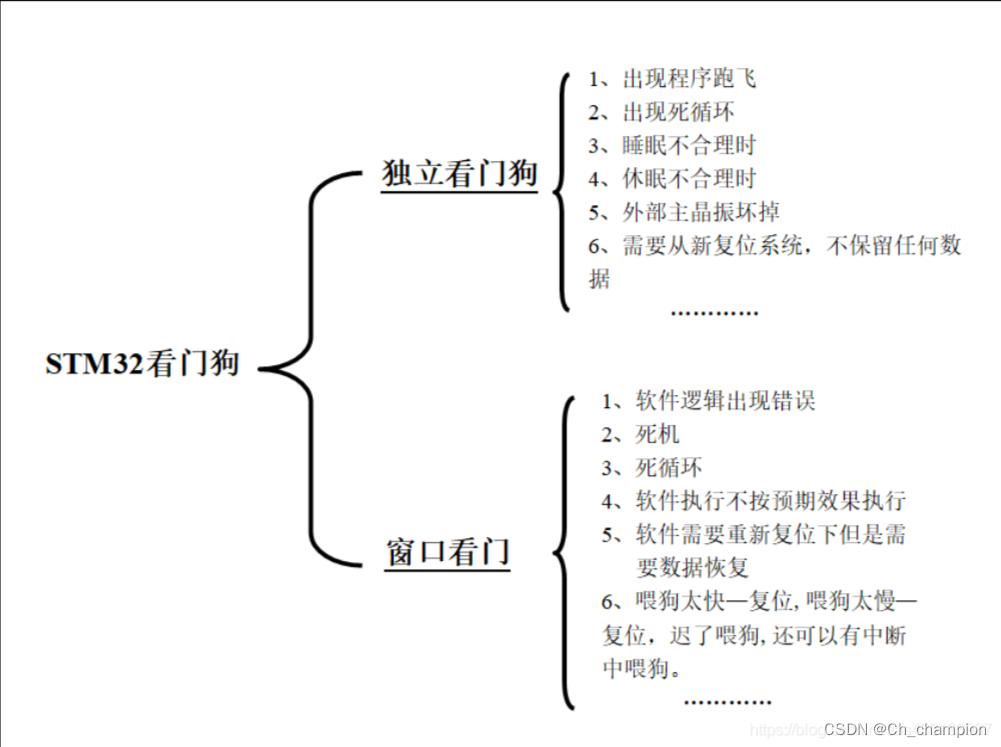
一、开发环境
1、硬件平台
STM32F401CEU6
内部Flash : 512Kbytes,SARM : 96 Kbytes
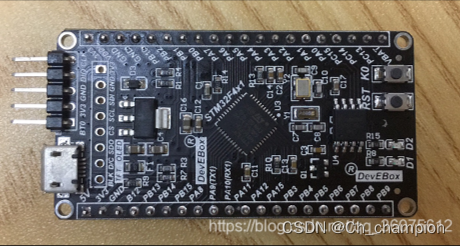
二、STM32CubeMx配置
2.1、系统时钟配置

2.2、下载调试配置

2.3、TIM配置(1ms中断)

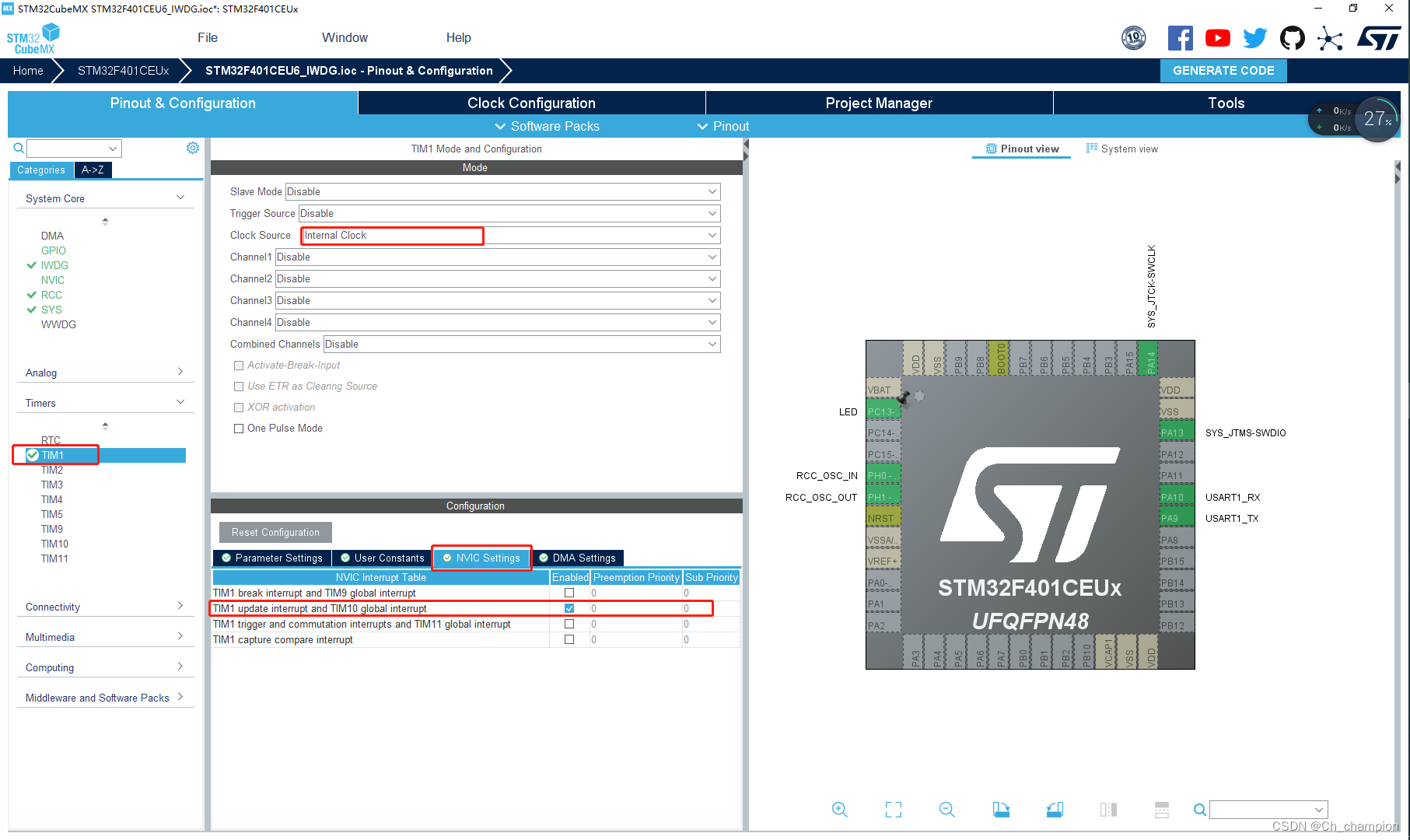
2.4、usart1配置
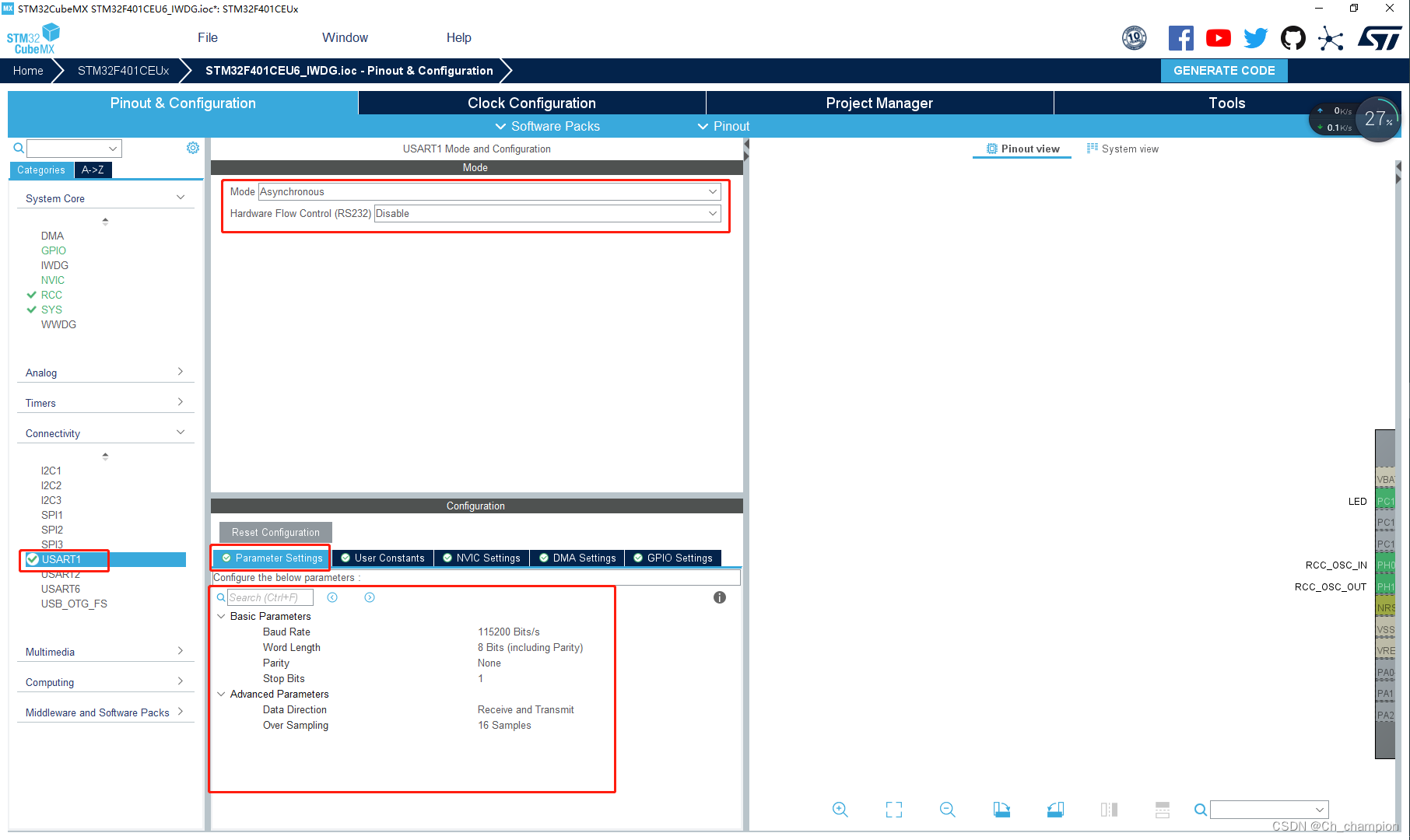

2.5、独立看门狗(IWDG)
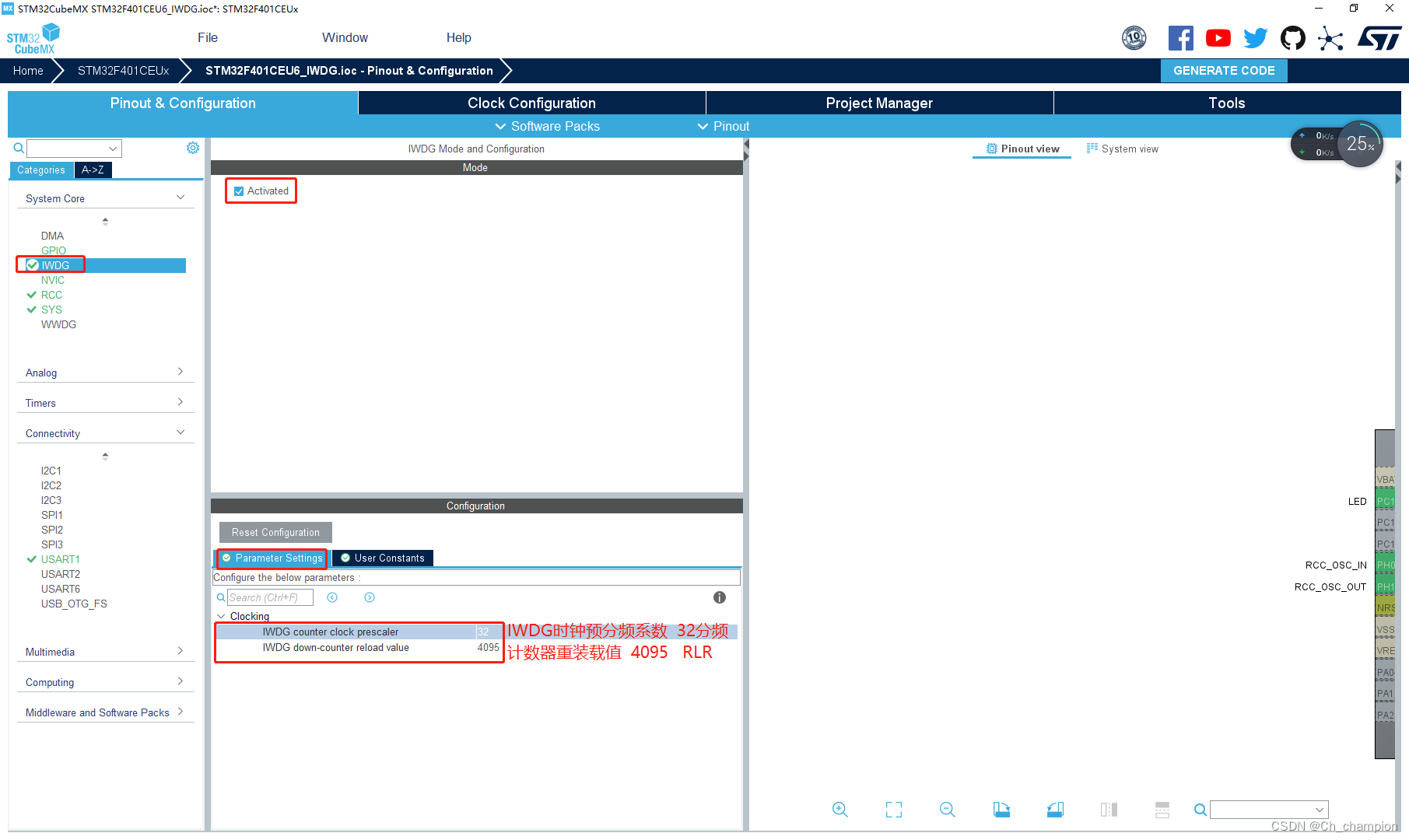
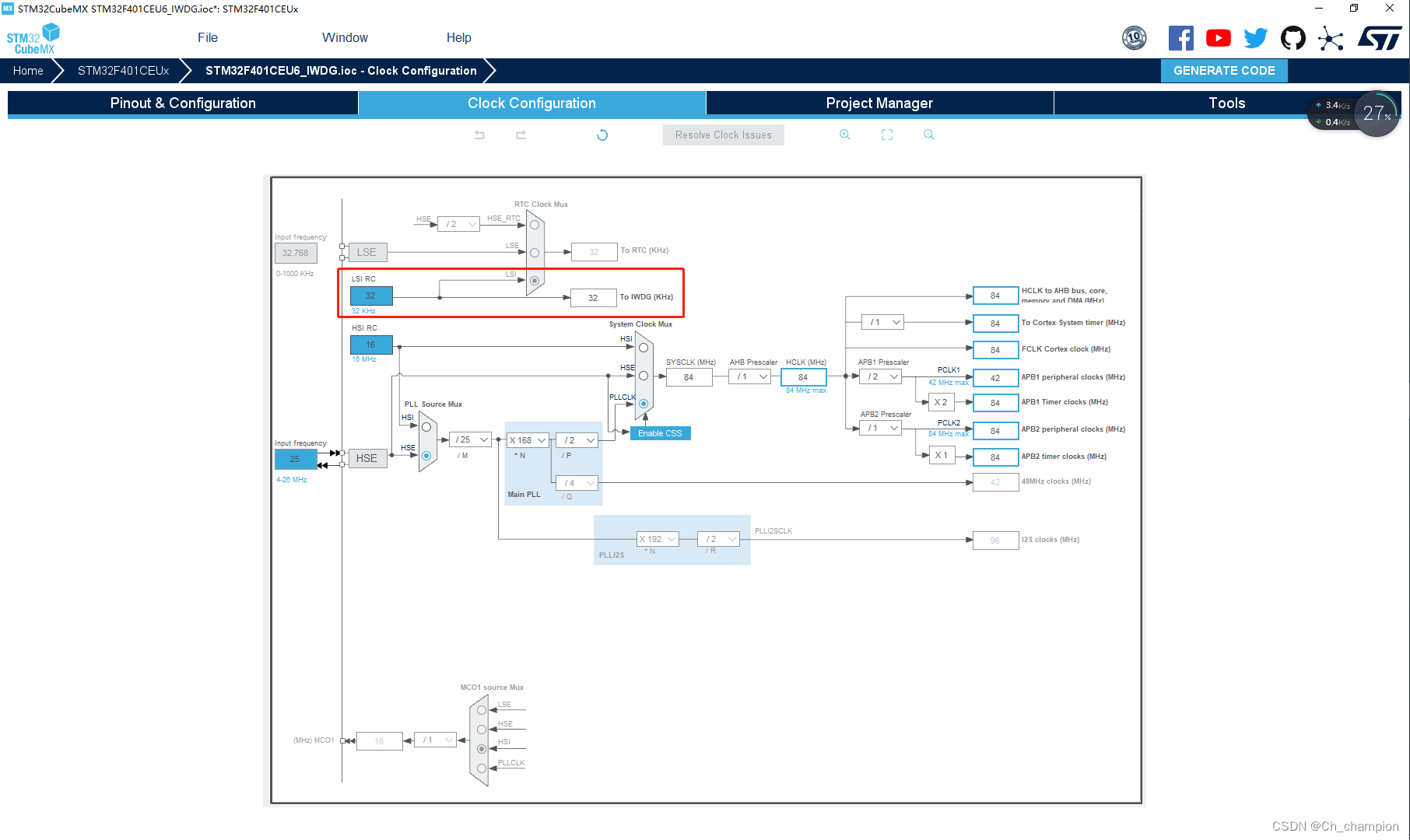
A) IWDG时钟预分频系数 32分频
B) 计数器重装载值 4095 RLR
时钟频率LSI=32KHz, 一个看门狗时钟周期就是最短超时时间。(M4内核)
最长超时时间= (IWDG_RLR寄存器最大值)x 看门狗时钟周期
超出(溢出)时间计算:单位为 ms
Tout=((4×2^PRER) ×RLR)/LSI时钟频率
通过公式得出:Tout=(4x2^3)×4095/32=4095ms
对应不同预分频系数的PRER值:
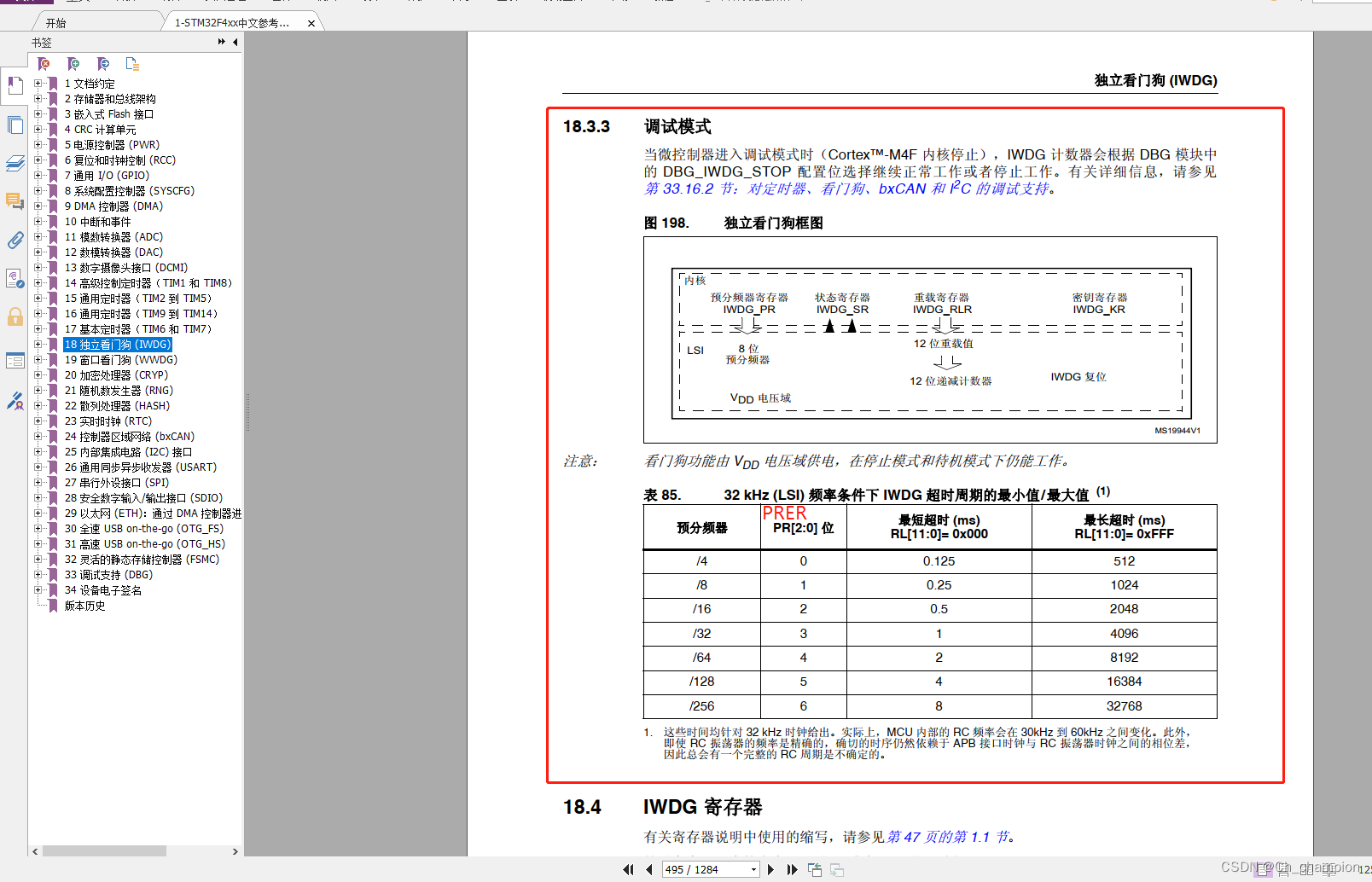
详解:
Tout 为看门狗溢出时间(单位为 ms); prer 为看门狗时钟预分频值( IWDG_PR 值),范围为 0~7; rlr 为看门狗的重装载值( IWDG_RLR 的值);
我们设定prer值为6(6 代表的是 256 分频, HAL 库中可以使用宏定义标识符IWDG_PRESCALER_256),rlr值为4095,那么就可以得到Tout=256×4095/32=32760ms。这样,看门狗的溢出时间就是32760ms。只要你在32.76秒钟之内,有一次写入 0XAAAA 到 IWDG_KR,就不会导致看门狗复位(当然写入多次也是可以的)。这里需要提醒大家的是,看门狗的时钟不是准确的 32Khz,所以在喂狗的时候,最好不要太晚了,否则,有可能发生看门狗复位。
2.6、生成代码
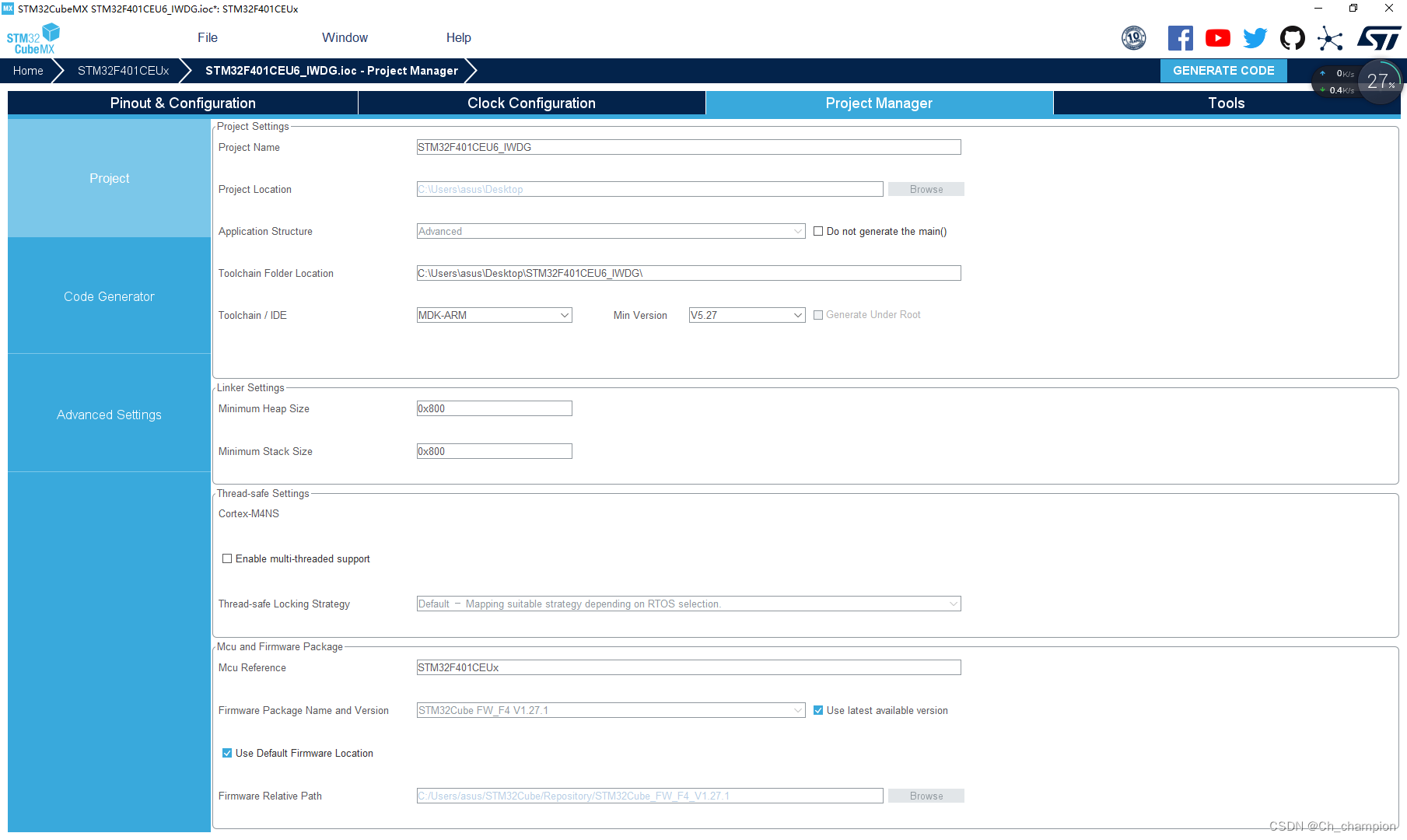
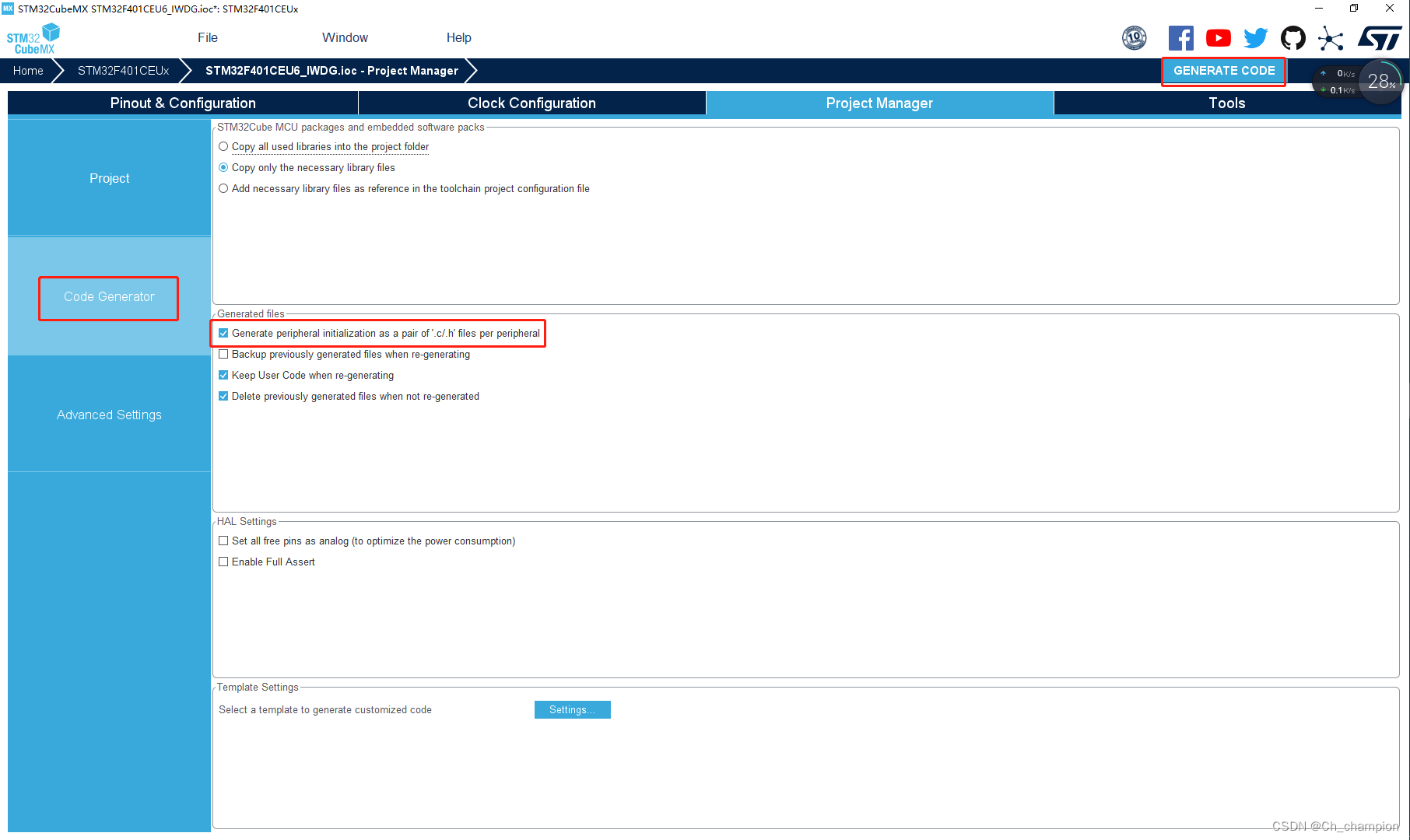
三、编码
1、usart.c
/* USER CODE BEGIN Header */
/********************************************************************************* @file usart.c* @brief This file provides code for the configuration* of the USART instances.******************************************************************************* @attention** Copyright (c) 2023 STMicroelectronics.* All rights reserved.** This software is licensed under terms that can be found in the LICENSE file* in the root directory of this software component.* If no LICENSE file comes with this software, it is provided AS-IS.********************************************************************************/
/* USER CODE END Header */
/* Includes ------------------------------------------------------------------*/
#include "usart.h"/* USER CODE BEGIN 0 *//* USER CODE END 0 */UART_HandleTypeDef huart1;/* USART1 init function */void MX_USART1_UART_Init(void)
{/* USER CODE BEGIN USART1_Init 0 *//* USER CODE END USART1_Init 0 *//* USER CODE BEGIN USART1_Init 1 *//* USER CODE END USART1_Init 1 */huart1.Instance = USART1;huart1.Init.BaudRate = 115200;huart1.Init.WordLength = UART_WORDLENGTH_8B;huart1.Init.StopBits = UART_STOPBITS_1;huart1.Init.Parity = UART_PARITY_NONE;huart1.Init.Mode = UART_MODE_TX_RX;huart1.Init.HwFlowCtl = UART_HWCONTROL_NONE;huart1.Init.OverSampling = UART_OVERSAMPLING_16;if (HAL_UART_Init(&huart1) != HAL_OK){Error_Handler();}/* USER CODE BEGIN USART1_Init 2 *//* USER CODE END USART1_Init 2 */}void HAL_UART_MspInit(UART_HandleTypeDef* uartHandle)
{GPIO_InitTypeDef GPIO_InitStruct = {0};if(uartHandle->Instance==USART1){/* USER CODE BEGIN USART1_MspInit 0 *//* USER CODE END USART1_MspInit 0 *//* USART1 clock enable */__HAL_RCC_USART1_CLK_ENABLE();__HAL_RCC_GPIOA_CLK_ENABLE();/**USART1 GPIO ConfigurationPA9 ------> USART1_TXPA10 ------> USART1_RX*/GPIO_InitStruct.Pin = GPIO_PIN_9|GPIO_PIN_10;GPIO_InitStruct.Mode = GPIO_MODE_AF_PP;GPIO_InitStruct.Pull = GPIO_NOPULL;GPIO_InitStruct.Speed = GPIO_SPEED_FREQ_VERY_HIGH;GPIO_InitStruct.Alternate = GPIO_AF7_USART1;HAL_GPIO_Init(GPIOA, &GPIO_InitStruct);/* USART1 interrupt Init */HAL_NVIC_SetPriority(USART1_IRQn, 0, 0);HAL_NVIC_EnableIRQ(USART1_IRQn);/* USER CODE BEGIN USART1_MspInit 1 *//* USER CODE END USART1_MspInit 1 */}
}void HAL_UART_MspDeInit(UART_HandleTypeDef* uartHandle)
{if(uartHandle->Instance==USART1){/* USER CODE BEGIN USART1_MspDeInit 0 *//* USER CODE END USART1_MspDeInit 0 *//* Peripheral clock disable */__HAL_RCC_USART1_CLK_DISABLE();/**USART1 GPIO ConfigurationPA9 ------> USART1_TXPA10 ------> USART1_RX*/HAL_GPIO_DeInit(GPIOA, GPIO_PIN_9|GPIO_PIN_10);/* USART1 interrupt Deinit */HAL_NVIC_DisableIRQ(USART1_IRQn);/* USER CODE BEGIN USART1_MspDeInit 1 *//* USER CODE END USART1_MspDeInit 1 */}
}/* USER CODE BEGIN 1 */
#include "stdio.h"
#ifdef __GNUC__/* With GCC/RAISONANCE, small printf (option LD Linker->Libraries->Small printfset to 'Yes') calls __io_putchar() */#define PUTCHAR_PROTOTYPE int __io_putchar(int ch)
#else#define PUTCHAR_PROTOTYPE int fputc(int ch, FILE *f)
#endif /* __GNUC__ */
/*** @brief Retargets the C library printf function to the USART.* @param None* @retval None*/
PUTCHAR_PROTOTYPE
{/* Place your implementation of fputc here *//* e.g. write a character to the EVAL_COM1 and Loop until the end of transmission */HAL_UART_Transmit(&huart1, (uint8_t *)&ch, 1, 0xFFFF);return ch;
}int fgetc(FILE * f)
{uint8_t ch = 0;HAL_UART_Receive(&huart1, (uint8_t *)&ch, 1, 0xffff);return ch;
}/* USER CODE END 1 */
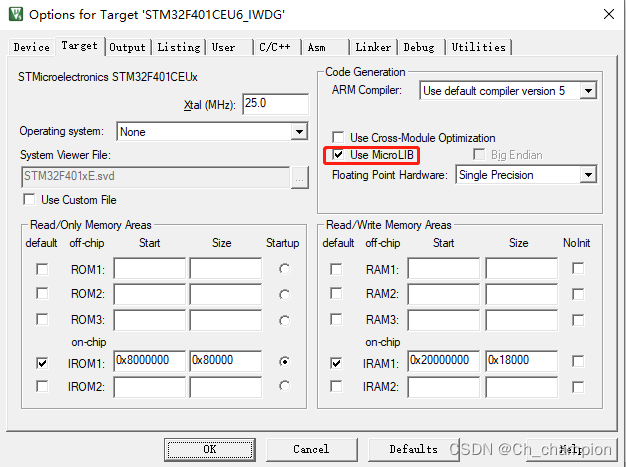
2、 tim.c
/* USER CODE BEGIN Header */
/********************************************************************************* @file tim.c* @brief This file provides code for the configuration* of the TIM instances.******************************************************************************* @attention** Copyright (c) 2023 STMicroelectronics.* All rights reserved.** This software is licensed under terms that can be found in the LICENSE file* in the root directory of this software component.* If no LICENSE file comes with this software, it is provided AS-IS.********************************************************************************/
/* USER CODE END Header */
/* Includes ------------------------------------------------------------------*/
#include "tim.h"/* USER CODE BEGIN 0 *//* USER CODE END 0 */TIM_HandleTypeDef htim1;/* TIM1 init function */
void MX_TIM1_Init(void)
{/* USER CODE BEGIN TIM1_Init 0 *//* USER CODE END TIM1_Init 0 */TIM_ClockConfigTypeDef sClockSourceConfig = {0};TIM_MasterConfigTypeDef sMasterConfig = {0};/* USER CODE BEGIN TIM1_Init 1 *//* USER CODE END TIM1_Init 1 */htim1.Instance = TIM1;htim1.Init.Prescaler = 84-1;htim1.Init.CounterMode = TIM_COUNTERMODE_UP;htim1.Init.Period = 1000-1;htim1.Init.ClockDivision = TIM_CLOCKDIVISION_DIV1;htim1.Init.RepetitionCounter = 0;htim1.Init.AutoReloadPreload = TIM_AUTORELOAD_PRELOAD_DISABLE;if (HAL_TIM_Base_Init(&htim1) != HAL_OK){Error_Handler();}sClockSourceConfig.ClockSource = TIM_CLOCKSOURCE_INTERNAL;if (HAL_TIM_ConfigClockSource(&htim1, &sClockSourceConfig) != HAL_OK){Error_Handler();}sMasterConfig.MasterOutputTrigger = TIM_TRGO_RESET;sMasterConfig.MasterSlaveMode = TIM_MASTERSLAVEMODE_DISABLE;if (HAL_TIMEx_MasterConfigSynchronization(&htim1, &sMasterConfig) != HAL_OK){Error_Handler();}/* USER CODE BEGIN TIM1_Init 2 *//* USER CODE END TIM1_Init 2 */}void HAL_TIM_Base_MspInit(TIM_HandleTypeDef* tim_baseHandle)
{if(tim_baseHandle->Instance==TIM1){/* USER CODE BEGIN TIM1_MspInit 0 *//* USER CODE END TIM1_MspInit 0 *//* TIM1 clock enable */__HAL_RCC_TIM1_CLK_ENABLE();/* TIM1 interrupt Init */HAL_NVIC_SetPriority(TIM1_UP_TIM10_IRQn, 0, 0);HAL_NVIC_EnableIRQ(TIM1_UP_TIM10_IRQn);/* USER CODE BEGIN TIM1_MspInit 1 *//* USER CODE END TIM1_MspInit 1 */}
}void HAL_TIM_Base_MspDeInit(TIM_HandleTypeDef* tim_baseHandle)
{if(tim_baseHandle->Instance==TIM1){/* USER CODE BEGIN TIM1_MspDeInit 0 *//* USER CODE END TIM1_MspDeInit 0 *//* Peripheral clock disable */__HAL_RCC_TIM1_CLK_DISABLE();/* TIM1 interrupt Deinit */HAL_NVIC_DisableIRQ(TIM1_UP_TIM10_IRQn);/* USER CODE BEGIN TIM1_MspDeInit 1 *//* USER CODE END TIM1_MspDeInit 1 */}
}/* USER CODE BEGIN 1 */
#include "stdio.h"
#include "iwdg.h"
uint32_t timeCount_500ms = 0;
uint32_t timeCount_1000ms = 0;
uint8_t times_refresh = 0;
void HAL_TIM_PeriodElapsedCallback(TIM_HandleTypeDef *htim){if(htim->Instance == TIM1){ //任务计数1mstimeCount_500ms++;timeCount_1000ms++;if(timeCount_500ms==500){timeCount_500ms = 0;printf("time + 500ms\n");}if(timeCount_1000ms==1000){timeCount_1000ms = 0;printf("time + 1s\n");HAL_GPIO_TogglePin(LED_GPIO_Port, LED_Pin); //LED翻转 --闪烁表示喂狗成功times_refresh++;if (times_refresh < 2) { HAL_IWDG_Refresh(&hiwdg); //喂狗printf("成功喂狗!!! \n");} else if (times_refresh == 5){times_refresh = 0;printf("超时喂狗!!! \n");}}}
}/* USER CODE END 1 */
只需关注HAL库独立窗口狗以下的API即可:
HAL_WWDG_Init(WWDG_HandleTypeDef *hwwdg); //看门狗初始化HAL_WWDG_Refresh(WWDG_HandleTypeDef *hwwdg); //喂狗3、iwdg.c 文件 默认即可
4、main.c文件
/* USER CODE BEGIN Header */
/********************************************************************************* @file : main.c* @brief : Main program body******************************************************************************* @attention** Copyright (c) 2023 STMicroelectronics.* All rights reserved.** This software is licensed under terms that can be found in the LICENSE file* in the root directory of this software component.* If no LICENSE file comes with this software, it is provided AS-IS.********************************************************************************/
/* USER CODE END Header */
/* Includes ------------------------------------------------------------------*/
#include "main.h"
#include "iwdg.h"
#include "tim.h"
#include "usart.h"
#include "gpio.h"/* Private includes ----------------------------------------------------------*/
/* USER CODE BEGIN Includes */
#include "stdio.h"
/* USER CODE END Includes *//* Private typedef -----------------------------------------------------------*/
/* USER CODE BEGIN PTD *//* USER CODE END PTD *//* Private define ------------------------------------------------------------*/
/* USER CODE BEGIN PD *//* USER CODE END PD *//* Private macro -------------------------------------------------------------*/
/* USER CODE BEGIN PM *//* USER CODE END PM *//* Private variables ---------------------------------------------------------*//* USER CODE BEGIN PV *//* USER CODE END PV *//* Private function prototypes -----------------------------------------------*/
void SystemClock_Config(void);
/* USER CODE BEGIN PFP *//* USER CODE END PFP *//* Private user code ---------------------------------------------------------*/
/* USER CODE BEGIN 0 *//* USER CODE END 0 *//*** @brief The application entry point.* @retval int*/
int main(void)
{/* USER CODE BEGIN 1 *//* USER CODE END 1 *//* MCU Configuration--------------------------------------------------------*//* Reset of all peripherals, Initializes the Flash interface and the Systick. */HAL_Init();/* USER CODE BEGIN Init *//* USER CODE END Init *//* Configure the system clock */SystemClock_Config();/* USER CODE BEGIN SysInit *//* USER CODE END SysInit *//* Initialize all configured peripherals */MX_GPIO_Init();MX_USART1_UART_Init();MX_TIM1_Init();MX_IWDG_Init();/* USER CODE BEGIN 2 */HAL_TIM_Base_Start_IT(&htim1);printf("heihei iwdg \r\n");/* USER CODE END 2 *//* Infinite loop *//* USER CODE BEGIN WHILE */while (1){/* USER CODE END WHILE *//* USER CODE BEGIN 3 */}/* USER CODE END 3 */
}/*** @brief System Clock Configuration* @retval None*/
void SystemClock_Config(void)
{RCC_OscInitTypeDef RCC_OscInitStruct = {0};RCC_ClkInitTypeDef RCC_ClkInitStruct = {0};/** Configure the main internal regulator output voltage*/__HAL_RCC_PWR_CLK_ENABLE();__HAL_PWR_VOLTAGESCALING_CONFIG(PWR_REGULATOR_VOLTAGE_SCALE2);/** Initializes the RCC Oscillators according to the specified parameters* in the RCC_OscInitTypeDef structure.*/RCC_OscInitStruct.OscillatorType = RCC_OSCILLATORTYPE_LSI|RCC_OSCILLATORTYPE_HSE;RCC_OscInitStruct.HSEState = RCC_HSE_ON;RCC_OscInitStruct.LSIState = RCC_LSI_ON;RCC_OscInitStruct.PLL.PLLState = RCC_PLL_ON;RCC_OscInitStruct.PLL.PLLSource = RCC_PLLSOURCE_HSE;RCC_OscInitStruct.PLL.PLLM = 25;RCC_OscInitStruct.PLL.PLLN = 168;RCC_OscInitStruct.PLL.PLLP = RCC_PLLP_DIV2;RCC_OscInitStruct.PLL.PLLQ = 4;if (HAL_RCC_OscConfig(&RCC_OscInitStruct) != HAL_OK){Error_Handler();}/** Initializes the CPU, AHB and APB buses clocks*/RCC_ClkInitStruct.ClockType = RCC_CLOCKTYPE_HCLK|RCC_CLOCKTYPE_SYSCLK|RCC_CLOCKTYPE_PCLK1|RCC_CLOCKTYPE_PCLK2;RCC_ClkInitStruct.SYSCLKSource = RCC_SYSCLKSOURCE_PLLCLK;RCC_ClkInitStruct.AHBCLKDivider = RCC_SYSCLK_DIV1;RCC_ClkInitStruct.APB1CLKDivider = RCC_HCLK_DIV2;RCC_ClkInitStruct.APB2CLKDivider = RCC_HCLK_DIV1;if (HAL_RCC_ClockConfig(&RCC_ClkInitStruct, FLASH_LATENCY_2) != HAL_OK){Error_Handler();}
}/* USER CODE BEGIN 4 *//* USER CODE END 4 *//*** @brief This function is executed in case of error occurrence.* @retval None*/
void Error_Handler(void)
{/* USER CODE BEGIN Error_Handler_Debug *//* User can add his own implementation to report the HAL error return state */__disable_irq();while (1){}/* USER CODE END Error_Handler_Debug */
}#ifdef USE_FULL_ASSERT
/*** @brief Reports the name of the source file and the source line number* where the assert_param error has occurred.* @param file: pointer to the source file name* @param line: assert_param error line source number* @retval None*/
void assert_failed(uint8_t *file, uint32_t line)
{/* USER CODE BEGIN 6 *//* User can add his own implementation to report the file name and line number,ex: printf("Wrong parameters value: file %s on line %d\r\n", file, line) *//* USER CODE END 6 */
}
#endif /* USE_FULL_ASSERT */
四、运行结果
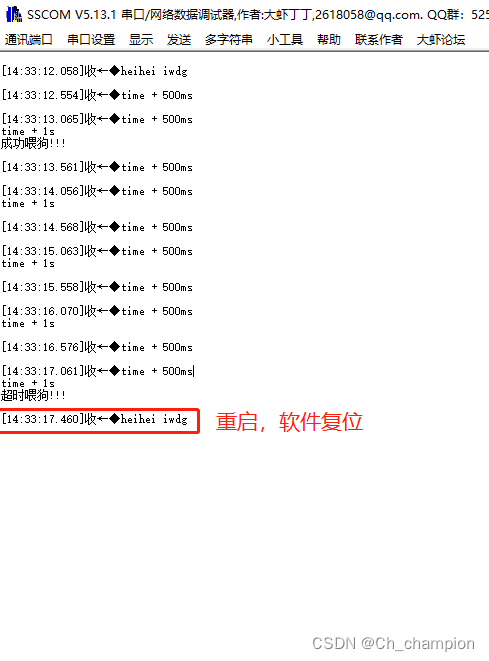
五、总结
好了,介绍完毕。有了它,再也不用担心,程序跑飞了,希望对你有所帮助,谢谢光临!感谢参阅。
